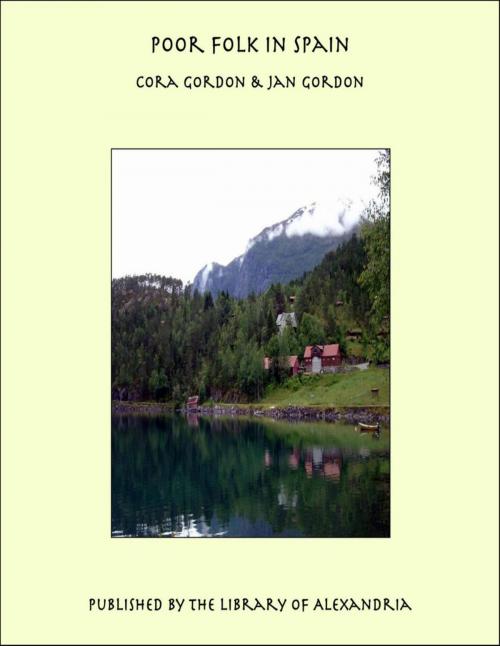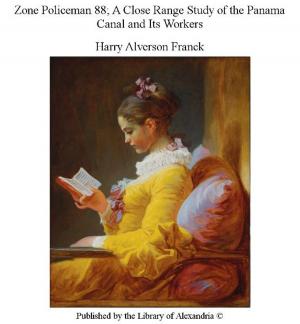| Author: | Cora Gordon | ISBN: | 9781465551696 |
| Publisher: | Library of Alexandria | Publication: | March 8, 2015 |
| Imprint: | Language: | English |
| Author: | Cora Gordon |
| ISBN: | 9781465551696 |
| Publisher: | Library of Alexandria |
| Publication: | March 8, 2015 |
| Imprint: | |
| Language: | English |
LONDON We had tasted of Spain before ever we had crossed her frontiers. Indeed, perhaps Spain is the easiest country to obtain samples from without the fatigue of travelling. The Spaniard carries his atmosphere with him: wherever he goes he re-creates in his immediate surroundings more than a hint of his national existence. The Englishman abroad may be English—more brutally and uncompromisingly English than the Spaniard is Spanish—yet he does not carry England with him. He does not, that is, re-create England to the extent of making her seem quite real abroad; there she appears alien, remote, somewhat out of place. So, too, neither the Russian, the German, the Dane, the Portuguese, the Italian, nor the American can carry with him the flavour of his homeland in an essence sufficiently concentrated to withstand the insidious infiltration of a foreign atmosphere. To some extent the Scandinavian countries, Norway and Sweden, have this power; but Spain is thus gifted in the greatest measure. These three countries seem to possess a national unconsciousness which fends them off from too close a contact with lands which are foreign to them; perhaps one might almost accuse them of a lack of sensitiveness in certain aspects.... However, be the reason what it may, we had gathered some experience of Spain in Paris before, and in London during the war. What we had tasted we had liked, and so when in our low-ceilinged attic refuge in London we gazed out upon a sky covered with flat cloud, as though with a dirty blanket, and wondered how we might escape in order to seek for our original selves—if they were not irretrievably lost—we thought of Spain. I think that we went to Spain to look for something that the war had taken from us. It was as though the low ceiling of our room, and the low-lying sky, shut us in with something which was not altogether true; indeed, we feel that many years must pass before the dissipation of this curious sensation of unreality which the war had stamped on to every one, except the most callous. It is now clear that peace is the normal condition of the human race. In the olden days this was not the case, but the tendency has been changing, and to-day we increase our powers during times of peace, and our powers fall from us during the disorganizations of war. The artist, who is the barometer of social change, was attuned to peace. In peace he exercises important functions. But with the sudden outbreak of war the whole foundation of his being was suddenly torn away. When war broke out Art for the artist seemed almost meaningless. In the face of a human catastrophe who could paint pictures? Nero may have fiddled while Rome was burning, but it must have been a poor meaningless tune that he played, some popular jingle, a Roman variation of "Ta-ra-ra-Boom-de-Ay." We had come at last to a peace which still carried on its breezes all the poisons of war, and we, at least, felt an imperative need of escape to some place where the war had not been; to some place where perchance life had carried on a not too distorted existence since 1914. Spain drew us to her more than did Scandinavia. Romance certainly had a finger in it; the sun perhaps two fingers—for we are undoubted sun-worshippers; the music of Spain, which had attracted us in Paris, causing Jan to abandon the banjo for the guitar, added an appeal; and I think an exhibition of Spanish landscapes by Wyndham Tryon at the Twenty-One Galleries settled the matter. We had been in Majorca before the war, and this combined with our experience of Spaniards in Paris had fixed in our minds a belief in a simplicity and courtliness of the Spanish people which we hoped would be very soothing. Finally, two houses were offered by a friend rent free for the whole of the summer, together with introductions which would smooth the way. We then packed up painting materials, stamped clothes into a trunk, worried a strangely assorted collection of packages down our narrow and twisted staircase into a cab, and so—hey, for the Sun, southward
LONDON We had tasted of Spain before ever we had crossed her frontiers. Indeed, perhaps Spain is the easiest country to obtain samples from without the fatigue of travelling. The Spaniard carries his atmosphere with him: wherever he goes he re-creates in his immediate surroundings more than a hint of his national existence. The Englishman abroad may be English—more brutally and uncompromisingly English than the Spaniard is Spanish—yet he does not carry England with him. He does not, that is, re-create England to the extent of making her seem quite real abroad; there she appears alien, remote, somewhat out of place. So, too, neither the Russian, the German, the Dane, the Portuguese, the Italian, nor the American can carry with him the flavour of his homeland in an essence sufficiently concentrated to withstand the insidious infiltration of a foreign atmosphere. To some extent the Scandinavian countries, Norway and Sweden, have this power; but Spain is thus gifted in the greatest measure. These three countries seem to possess a national unconsciousness which fends them off from too close a contact with lands which are foreign to them; perhaps one might almost accuse them of a lack of sensitiveness in certain aspects.... However, be the reason what it may, we had gathered some experience of Spain in Paris before, and in London during the war. What we had tasted we had liked, and so when in our low-ceilinged attic refuge in London we gazed out upon a sky covered with flat cloud, as though with a dirty blanket, and wondered how we might escape in order to seek for our original selves—if they were not irretrievably lost—we thought of Spain. I think that we went to Spain to look for something that the war had taken from us. It was as though the low ceiling of our room, and the low-lying sky, shut us in with something which was not altogether true; indeed, we feel that many years must pass before the dissipation of this curious sensation of unreality which the war had stamped on to every one, except the most callous. It is now clear that peace is the normal condition of the human race. In the olden days this was not the case, but the tendency has been changing, and to-day we increase our powers during times of peace, and our powers fall from us during the disorganizations of war. The artist, who is the barometer of social change, was attuned to peace. In peace he exercises important functions. But with the sudden outbreak of war the whole foundation of his being was suddenly torn away. When war broke out Art for the artist seemed almost meaningless. In the face of a human catastrophe who could paint pictures? Nero may have fiddled while Rome was burning, but it must have been a poor meaningless tune that he played, some popular jingle, a Roman variation of "Ta-ra-ra-Boom-de-Ay." We had come at last to a peace which still carried on its breezes all the poisons of war, and we, at least, felt an imperative need of escape to some place where the war had not been; to some place where perchance life had carried on a not too distorted existence since 1914. Spain drew us to her more than did Scandinavia. Romance certainly had a finger in it; the sun perhaps two fingers—for we are undoubted sun-worshippers; the music of Spain, which had attracted us in Paris, causing Jan to abandon the banjo for the guitar, added an appeal; and I think an exhibition of Spanish landscapes by Wyndham Tryon at the Twenty-One Galleries settled the matter. We had been in Majorca before the war, and this combined with our experience of Spaniards in Paris had fixed in our minds a belief in a simplicity and courtliness of the Spanish people which we hoped would be very soothing. Finally, two houses were offered by a friend rent free for the whole of the summer, together with introductions which would smooth the way. We then packed up painting materials, stamped clothes into a trunk, worried a strangely assorted collection of packages down our narrow and twisted staircase into a cab, and so—hey, for the Sun, southward















